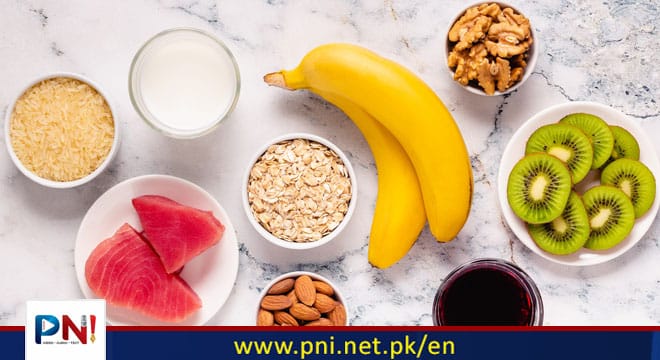ISLAMABAD, June 07 (ONLINE): Researchers from Finland recently conducted a study to examine the relationship between sleep duration and fruit and vegetable consumption.
When people do not get enough sleep, this can affect the body in many ways, including immune system functioning, mental health, and cardiovascular health.
The study found that people who consumed fewer fruits or vegetables per day either slept less or got an excessive amount of sleep.
Getting a good night’s sleep is not always as simple as it sounds. While the Centers for Disease Control and Prevention (CDC)Trusted Source recommends that adults ages 18 to 60 get at least 7 hours of sleep per night, around 30% of adults get lessTrusted Source than the recommended amount of sleep.
A number of things can affect sleep patterns, including sleep hygiene and mental health issues. Researchers from Finland’s University of Helsinki, National Institute for Health and Welfare, and Turku University of Applied Sciences recently examined how total sleep duration might influence dietary choices.
Their study, which appears in Frontiers in Nutrition, found that people who eat around 460 grams of fruits and vegetables per day were more likely to get an ideal amount of rest than those who ate fewer of these foods.
The researchers observed that lower consumption of these foods was associated with sleeping for inadequate or excessive amounts of time, both of which have negative implications.
Analyzing self-questionnaires and sleep chronotypes
When people sleep, their bodies undergo cell repair, hormone regulation, and store new memoriesTrusted Source. Not getting enough sleep can disrupt these natural processes.
As the National Institutes of HealthTrusted Source explains: “During sleep, your body is working to support healthy brain function and maintain your physical health.”
While some people have no problem sleeping, others experience trouble with sleep due to poor sleep hygiene, sleep apnea, and insomnia. Also, some people sleep excessively – more than 9 hours per night, and according to the Sleep Foundation, this can contribute to mental health and heart issues.
The current study examined the sleep and nutrition habits of 5,043 adults in Finland. During various questionnaires, the participants provided information about their sleep duration and food intake.
The participants also provided information about their socioeconomic status, body mass index, physical activity, and health problems.
Since the World Health Organization (WHO) recommends eating 5 servings of fruits and vegetables per dayTrusted Source, or 400 grams, the researchers wanted to see which people were coming close to that recommendation.
The researchers also analyzed the participants’ chronotypes, as a prior studyTrusted Source found no influence of chronotypes (sleep timing) on fruit and vegetable intake the following day. According to the scientists, chronotype “reflects an individual’s preference for timing of activities during the day (morning or evening preference).”
Fruit and vegetable intake matter
After analyzing the self-questionnaires, the researchers divided people into groups based on how long they reported sleeping each night:
Short sleepers (21% of participants) slept an average of 6 hours per night.
Normal sleepers (76.1% of participants) slept an average of 7.7 hours per night.
Long sleepers (2.9% of participants) slept an average of 10.1 hours per night.
The researchers found that “normal sleepers” who slept 7 to 9 hours per night had a higher fruit and vegetable intake than the other groups.
“Normal sleepers” consumed an average of 463.1 grams of fruits and vegetables per day, which was higher than both the short and long sleeper groups.
Short sleepers consumed an average of 37 fewer grams per day than normal sleepers. Both short and normal sleepers fell within the WHO’s recommended daily intake but consumed less than the Nordic Council of Ministers’ recommendation of 500 to 800 grams daily.
Long sleepers consumed an average of 73.4 fewer grams compared to normal sleepers.
Upon further analysis, the researchers noted some differences in the consumption of specific types of foods.
When dividing vegetables into subgroups, they noticed “significant differences” in the amount of green leafy vegetables, root vegetables, and fruit vegetables (such as tomatoes and cucumbers) in short sleepers compared to the normal sleepers. Long sleepers also consumed fewer green leafy vegetables and fruit vegetables than normal sleepers.
In fruit subgroups, researchers also observed significant differences in berries as well as other fresh and canned fruit varieties in short sleepers compared to normal sleepers. Apples were the only fruit subgroup that appeared to differ significantly between long and normal sleepers.
The researchers also examined whether the subjects’ self-reported chronotypes factored into their sleep duration. They sorted people into the following categories based on whether the participants considered themselves most productive in the morning, evening, or somewhere in between.
Follow the PNI Facebook page for the latest news and updates.









